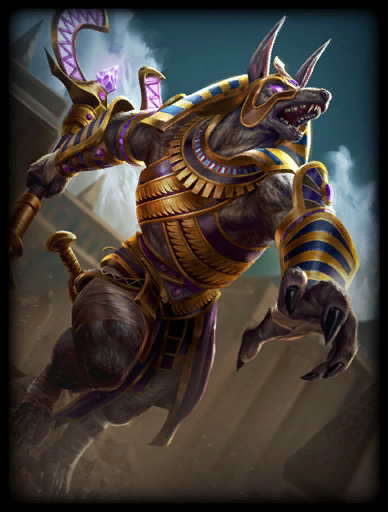Symbols: jackal, ox-hide hanging from a pole, embalming equipment, flail, flags
Cult Center: Heliopolis, Cynopolis
The jackal-god of mummification, he assisted in the rites by which a dead man was admitted to the underworld. Anubis was worshipped as the inventor of embalming and who embalmed the dead Osiris and thereby helping to preserve him that he might live again.
Anubis is portrayed as a man with the head of a jackal holding the divine sceptre carried by kings and gods; as simply a black jackal or as a dog accompanying Isis. His symbol was a black and white ox-hide splattered with blood and hanging from a pole. It's meaning is unknown.
Anubis had three important functions. He supervised the embalming of bodies. He received the mummy into the tomb and performed the Opening of the Mouth ceremony and then conducted the soul in the Field of Celestial Offerings. Most importantly though, Anubis monitored the Scales of Truth to protect the dead from deception and eternal death.
Early in Egyptian history, Anubis was a god of the dead. This role was usurped by Osiris as he rose in popularity.
The god of embalming is probably associated with the jackal due to the habits of jackals to lurk about tombs and graves. One of the reasons the early Egyptians sought to make their tombs more elaborate was to keep the bodies safe from the jackals lingering about the graves. It is only natural therefore that a god of mummification would be connected with them. By worshipping Anubis, the Egyptians hoped to invoke him to protect their deceased from jackals, and later, the natural decay that unprotected bodies endure.
Anubis was the son of Nephthys, and his father was Osiris. One myth says that Nephthys got Osiris drunk and the resultant seduction brought forth Anubis. Yet another says she disguised herself as Isis and seduced Osiris and subsequently gave birth to Anubis.

